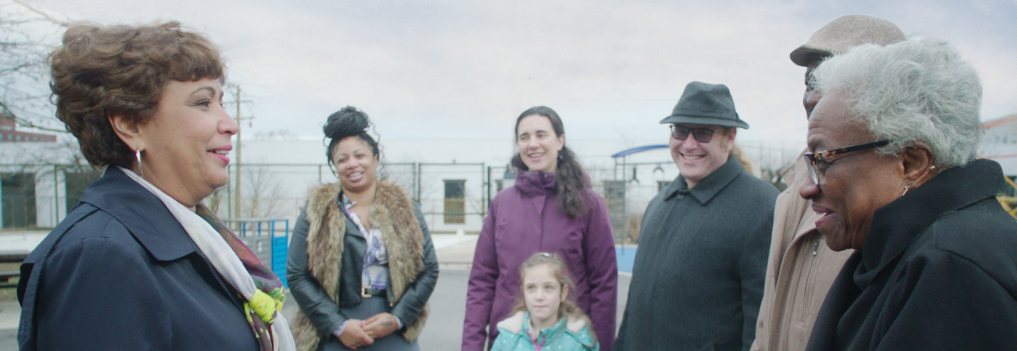Maria's Vision
Economic Opportunity and Inclusion
Over the next ten years, we can grow our population to two million as Philadelphia’s infrastructure is fully built out – and ensure equity every step of the way. In Maria’s Administration, every single city department will have an economic opportunity and inclusion plan. As a freshman Councilmember Maria authored historic changes to make our business tax code more fair and transparent. As Mayor, she will make Philadelphia a better place to start, run, and grow a business.
Maria's Vision for 2030
Reducing regulatory hurdles and red tape and creating a one-stop small business center
Investing in our city workforce and supporting efforts with our city partners
Prioritizing innovation and partnering with our eds and meds
Growing our cultural and creative economy
Contracting and procurement reform and expanding pathways for participation to small, local, and Black and Brown businesses
Expanding incentives for local and sustainable businesses
Aggressively pursuing competitive federal and state funding
“For our vision of Philadelphia in 2030, I am inspired by the goal of increasing our population to two million – we’ll get there by creating diverse, mixed income neighborhoods with access to transit, good schools, and family-sustaining jobs.”
Reforming Our Tax Code
As Councilmember, Maria authored historic reforms to our tax code to create a fair and progressive tax system, lower the tax burden on small businesses and manufacturers, and make sure corporations pay their fair share. As Mayor she will continue this work by eliminating the Net Profits Tax, which unduly burdens small businesses, encourages them to hide their profits, and limits their growth.
Maria's Record on Tax Reform
Business Tax Reform exempts small businesses on the first $100,000 of their business income and receipts tax (BIRT) liability, waives their licensing fees, and reduces their liability on sales made outside the city.
- Now at full implementation, more than 73,000 of the city’s nearly 100,000 neighborhood-based businesses are now fully exempt from BIRT liability.
Single Sales Factor (Manufacturing Tax Reform): As part of Bill No. 110554, Maria reformed the business tax liability structure for manufacturing, representing almost 70% in tax savings for this sector and enabling our local manufacturing businesses to better compete in the global economy.
- This reform saves Philadelphia’s manufacturing businesses $60 million/year.
Waiving Business Privilege License: Bill No. 110548-A reduced the tax burden on existing and new businesses by eliminating the fee for the issuance of the business privilege license for any business in the City of Philadelphia.
Use and Occupancy Tax: Use and Occupancy Tax Reform shielded small businesses from a massive tax increase due to the Actual Value Initiative (AVI), by entitling 69% of percent of Philadelphia businesses including 8,271 small “Mom and Pop” businesses, to a $2,000 tax exemption.
Regulatory Reform & Cutting Red Tape
We can make it easier to start a business, and not send people running from one department to the next, getting different instructions from each person they talk to. It currently takes over 150 steps to open a food establishment in Philadelphia, and that will no longer be the case in Maria’s administration. As Mayor, she will create incentives for businesses located in our city and give them a competitive edge, and will end policies that penalize Philadelphia-based businesses and limit their growth.
We will convene L&I, Health, Streets, and the Water Department to realign our inspection and permitting protocols and provide a single, clear pathway to jump start new businesses. Our business coordination center will open our city for entrepreneurship, investment, and growth.
Maria's Record Fighting for Higher Wages
No candidate has done more to raise wages and improve conditions for Philadelphia’s workers.
Co-authored Philadelphia’s original 21st Century Living Wage Standard, which lifted thousands of workers out of poverty, raising wages to $15/hour for city workers and contractors.
Won wage increases and better work conditions for thousands of airport workers campaigning alongside SEIU and UNITE.
Co-sponsored Philadelphia’s first paid sick leave requirement
Co-sponsored the Fair Work Week
Created the Domestic Workers Bill of Rights
Building Capacity in Small Businesses
Small businesses drive our neighborhood economies. During COVID they provided the essential services that got us through the worst days of the pandemic, so Maria made sure that we directed our small business relief efforts where they were most needed.
Our Commerce Department can do so much more to help our small businesses grow and thrive. As Mayor, Maria will realign our commercial corridor spending to help neighborhood businesses, particularly Black and Brown-owned businesses, build their back-office capacity and plan for growth. By providing technical assistance and closing the digital divide, we can ensure our small businesses are better prepared to navigate the challenges of the future.
Free Community College
Community College of Philadelphia will be tuition-free and will become our city’s job training hub. By expanding dual enrollment for high school students, offering free tuition to qualified Philadelphia high school graduates, and expanding access to re-training programs to workers who want to expand their skill set, we can train Philadelphia’s workforce for the economy of our city’s future.
CCP is ready now to take on this role, and the City can invest in growing CCP’s capacity even further by making it the central training hub for the city’s workforce as well. With federal investment in free community college as a top Biden administration priority, now is the time to move forward aggressively on this goal to meet the moment. We will also have a particular focus on engaging returning citizens and transitioning them to new pathways within our workforce.

Innovation, Eds and Meds, and Anchor Institutions
Higher education institutions and hospitals (eds and meds) have been widely recognized as anchors of regional economies and their impact is felt through Philadelphians employed, goods and services purchased, and innovations created. In addition to accounting for 8.4% of the region’s income (according to the Federal Reserve of Philadelphia), eds and meds lead to the emergence of companies in other industries.
We are also home to one of the nation’s top biotech hubs, which provides for booming career options with its emerging sectors. These jobs are family sustaining, and we must aggressively recruit and retain these companies, while training our citizenry for these jobs of the future.
Additionally, public-private partnerships and philanthropic investment from our anchor institutions are key to addressing the major infrastructure challenges and investments necessary to move our city forward. Penn has committed $100 million to the School District of Philadelphia, and we must leverage the expertise of the entire higher education community as we address the SDP’s infrastructure challenges. Similarly, our investments in closing the digital divide during the pandemic relied on close partnership with Comcast which must continue and grow as we ensure that all families are able to access high-speed internet for education, training, and employment opportunities.
Hilco’s redevelopment of the former PES refinery site offers an exciting opportunity as we anticipate the ongoing environmental remediation work, addressing 150 years of pollution, eventually giving way to the creation of the Bellwether District for e-commerce and life sciences. This generational transformation of a massive land area – a full 2% of the city – is an almost unprecedented opportunity for environmental justice and job creation.
Given our strategic location within a day’s drive of 75% of the U.S. population, with a growing international airport, rail access to the Northeast corridor, and with room to grow, this is an incredibly exciting time for Philadelphia if we can make the bold investments in our infrastructure to leverage private sector investment.
Growing Our Cultural and Creative Economy
Our cultural and creative economy will be fully integrated with my administration’s citywide economic development plan. The economic impact of our cultural and creative economy can and should be leveraged in every neighborhood. Maria’s administration will duplicate best practices from Boston and other cities who have done intentional work and planning to support arts and cultural organizations as we navigate the pandemic recovery.
Philadelphia is a one day drive for 75% of our country’s population. The core of Center City is home to world renowned institutions including the Barnes Foundation and Philadelphia Museum of Art, while our neighborhoods are filled with many smaller institutions that can be leveraged to more deeply engage our visitors. Our typical visitor is drawn to our historic attractions, and our opportunity and challenge is to engage that visitor to stay longer in Philadelphia and to come back for a return visit – every extra day and repeat visit multiplies the impact on our economy.
Key to this strategy will be more actively promoting the incredible quality and diversity of our growing restaurant scene. Neighborhood cultural destinations – like Chinatown – entice visitors to stay an extra day and our investment in promoting them will come straight back to Philadelphia in the form of dollars spent in our local, family-owned small businesses.
The Naval Yard expansion, stadium district, and improvements to FDR Park offer an opportunity to expand our business, entertainment, and nightlife sectors in an area that is accessible via transit and experiencing tremendous growth.

With intentional planning, our arts institutions can recover from the pandemic and expand their customer base through cross promotion and expansion of our creative economy.
In 2026, we will be in a national spotlight for the country’s 250th anniversary – now is the time for multiyear planning so we can leverage this opportunity along with our World Heritage designation to offer the world a new vision of what we offer when we invite them to come and REVISIT Philadelphia.
Contracting & Procurement Reform
City spending on goods and services should benefit Philadelphia-based businesses. Right now, a small number of large companies, most not based in the city, are awarded most city contracts. They know how to manipulate the contract process and present a ‘lowest bid,’ which is no longer a low bid after the inevitable change orders and delays. As Mayor, Maria will make our contracting process fairer and more equitable so our tax dollars are invested in building Philadelphia’s businesses:
Debundling: We will break up large contracts to end de-facto monopolies on city work and expand access to economic opportunity.
Accountability: We will not award new contracts to firms that are delayed or over budget on existing contracts and the responsible bidder will be held to a standard of transparency and accountability.
Local Priority: We will continue to expand and prioritize Philadelphia-based businesses.
State and Federal Funding
As Mayor, Maria will aggressively pursue competitive federal funding that we are currently leaving on the table. Additionally, she will work closely with Governor Shapiro to secure additional resources from the state. Philadelphia is the economic engine of Pennsylvania and when we demonstrate that we can make big, successful investments in Philadelphia’s future, we will attract not only more government funding but more philanthropic investment.
We can engage the Federal Department of Transportation and the state to plan and build the Roosevelt Blvd. transit extension to bring express service to one of our most trafficked and dangerous streets. By leveraging Philadelphia’s national standing and demonstrating our capacity and commitment to progressive infrastructure investment we can draw down more federal funds to transform our corridors.

There’s nothing wrong with Philly that we can’t fix together. I’m running to be your Accountability Mayor and get sh*t done. Sign up to join my campaign.

